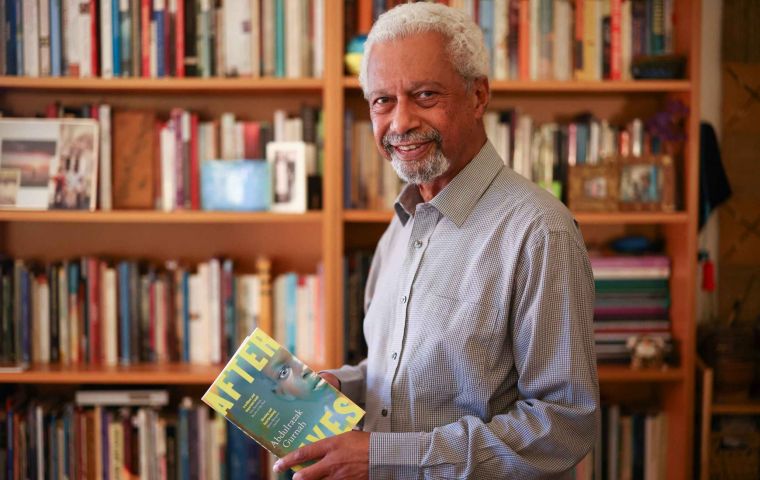MercoPress. South Atlantic News Agency
Tanzanian-born writer wins Literature Nobel Prize
 Gurnah lives in Brighton, England
Gurnah lives in Brighton, England The 72-year-old Tanzanian writer Abdulrazak Gurnah has been awarded the Nobel Prize for Literature was awarded this year by Swedish Academy.
A refugee in the United Kingdom in the late 1960s, Gurnah gained notoriety for his “empathetic and uncompromising” work “about the effects of colonialism and the fate of refugees,” the jury said.
It is the fifth time that an African novelist has been awarded the Nobel Prize for Literature.
The Tanzanian-born writer has been a keen observer of the effects of colonialism and immigration during a critically acclaimed 35-year career.
“I just want to write as truthfully as possible and try to say 'something noble'”, explained in an interview in Germany in 2016 this author, born in 1948 in Zanzibar, also the birthplace two years earlier Farrokh Bulsara (better known as Freddie Mercury).
Gurnah began to write after moving to the United Kingdom in the late 1960s when he was about 21 years old. “In a sense, it was something that I stumbled upon by accident rather than the fulfilment of a plan,” he acknowledged. “To a large extent, it had to do with the overwhelming sense of strangeness and difference that I felt there,” he recalled of his first years of emigration.
It was almost another 20 years before he published his first novel, “Memory of Departure”, in 1987. “Pilgrims Way” followed a year later and “Dottie” in 1990.
All three explored the experiences of immigrants in the UK at that time.
Critical acclaim came to him for his fourth novel, “Paradise” (1994), set in colonial East Africa during World War I and which earned him a spot on the shortlist for the prestigious British Booker Prize.
His 1996 play “Admiring Silence” tells the story of a young man who returns to Zanzibar 20 years after leaving for England, where he married a British woman and worked as a teacher.
Gurnah's works are “dominated by questions of identity and displacement, and how these are shaped by the legacies of colonialism and slavery,” wrote about his academic Luca Prono on the website of the British Council, a public body that promotes British culture.
“All of Gurnah's stories are based on the impact that migrating to a new geographical and social context has on the identity of his characters,” Prono stressed.
“one of the realities of our time is the displacement of so many foreigners to Europe,” Gurnah once said in a newspaper interview.
In 2002, with “By the Sea”, Gurnah returned to address the issue through the story of Saleh Omar, an asylum seeker who has just arrived in the UK.
His latest works include “Desertion” (2005), “The Last Gift” (2011) and “Afterlives” (2020), the story of a boy who was sold to German colonial troops.
Gurnah has recently retired as Professor of English and Postcolonial Literature at the University of Kent and lives in Brighton, southern England.




Top Comments
Disclaimer & comment rulesCommenting for this story is now closed.
If you have a Facebook account, become a fan and comment on our Facebook Page!